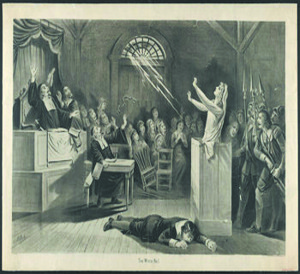In researching our family history, my sister Mary discovered that on our Knowles side we are descended from one bereft woman who was hung as a witch in 1651. This happened before the Salem Witch Trials. She was the second woman executed as a witch in the colonies. Though she was called a witch by her puritan neighbors for a dream she had, I think the best way to describe her would be that she was a woman mourning the death of her newborn child. She had a dream that he came to her. When confronted with her account, she refused to recant her experience. Being stubborn and not being able to tell a lie seem to be family traits.
Here is what researchers have said about our long ago grandmother: Alice (Mrs. Henry) Lake, executed as a witch. This account is by Alice Marie Beard.
“In about 1651, near modern-day Boston, a mother of five lost her baby to death. After her baby died, she imagined she saw the baby. Because of that, she was accused and convicted of being a witch, and she was executed. The claim in the town of Dorchester, MA, was that the devil was coming to her in the form of her deceased, beloved child. Records are scant, but they show she had an opportunity to recant her story on the day of her execution and possibly to save her life. She did not recant her story, but she said she knew why God was punishing her: She had engaged in sex prior to marriage, become pregnant, and attempted a self-abortion. Hollywood has missed a good story; Alice Lake’s story is a classic. She was ruled by two strong, womanly pulls — guilt and grief.
In the early part of the 20th century, Alice had a descendant who was a medical doctor who spent many years researching her story and trying to track her descendants. This man described Alice’s story best:
‘Here is a penitent, broken-hearted, submissive woman, laying bare the greatest secret of her bosom, asking forgiveness; yet the damnable tactics of her fanatical church string her up like a miserable tramp.’”
In my mind, I tried to imagine what the day of my grandmother’s death might have been like. Here is what I thought might have happened:
She put one foot in front of the other, walking slowly lest someone discover that she was truly in a hurry. She was barefoot. After all, it was a day kissed by the sun in the year 1651. It was autumn but during the time when summer wanted to intrude into fall. Boston had seen many days like this. Her shoes were sturdy and she wanted to leave them for her daughter. In fact, she chose to wear only a winter night gown so as not to deprive her family of any of her finer garments.
As she climbed the wooden steps to the scaffold she stared at the hooded man, his cloak folded over his arms and hands. She stood before him and decided she would put her hand out toward him. Would he unveil his hand so that she could drop the silver coins in his palm?
With hesitation, he uncovered his hand. She reached out and turned his hand over so that she could deliver the coins. The silver pieces were dry. She had no fear of him or of what was about to happen. Once she accomplished this task, Alice, or formally Mrs. Henry Lake, positioned herself over the floor boards set for release.
Alice knew her husband and children were watching her carefully as was the whole town. She did not want their last memory of her to be without dignity. She would not keen. Yes, she was penitent, yes, she was broken-hearted but she was determined not to be untrue to her experience or to those she loved. She would only tell the truth. Let them call her a witch. She knew who she was.
Her hangman looked long and hard at her. She did seem possessed by some demon. Her eyes were heaven bent and her body rocked slowly back and forth. Her arms seemed to cradle an invisible child.
Her coins were certainly a payment to do his job well. He knew with or without the coins he would make quick work of this hanging. No delayed death for this fragile creature. No one, including himself, wanted to see this tender woman sent to the next world.
The whole town had witnessed her trial. The judge begged her to recant her story. Her dead child did not appear to her, he asserted, and she hung her head and cried, “I cannot deny the fruit of my womb. He came to me in a dream.”
Alice’s mind wandered. She knew her dreams were confused but ultimately they brought her so much comfort at the time especially when her infant child reassured her that he was not unhappy and that she should go on with her life. Her mistake had been to share the contents of her dreams with her neighbor, a woman who had devoted her life to the teachings of her church. The neighbor lady always talked about the devil as though she knew him well. She confided in Alice about the women she suspected of witchcraft. She must have done the same to her. For within days, the whole community was abuzz about her dreams.
“Surely, the devil has made you his play thing. Rid yourself of him— take back your story, free yourself.”
“I will not lie. I had this dream. My God and Savior is only punishing me for earlier sins. I accept this punishment.”
“Whatever sin could one so young and innocent have committed?” the judge pressed.
“Your honor, my judge, when I was not married to the father of my children, I became pregnant. Before we married, I tried desperately to cast the child from my body but with no favorable termination. I feared being cast out from my faith for being intimate before marriage.”
“My husband and I married and it seemed, even though my child was born early, that no one held me accountable. These dreadful events have been a secret I have held until now. Only my husband knew my efforts to end my pregnancy.”
The judge interjected, “But this is not why you are here before me. Won’t you take back your tale of dead babies appearing to you? Don’t be so stubborn, woman.”
“But, judge, now that I have lost a child, the sixth to be born to me, to an untimely death, I know more than ever the error of my ways. God knew what I was guilty of and now you do, too. My punishment has only been delayed. I thank God for the time he has given me and for allowing me the joy of having children with the man I have always loved. I am ready to die.”
The judge was left with little choice but to condemn Alice to death. She accepted his verdict and was relieved. Her hanging day had come. It was on a warm autumn day in the year 1651.
The hangman placed the rough hewn necklace of death around Alice’s alabaster throat. Alice did not flinch. It was as though she were already gone from this life. A tear escaped the hangman’s eye as he pulled the lever to release the floor under which she stood. His gesture was with as much power as he could assert so as to cause her neck to break quickly and yet to make sure her head stayed attached to her body. He was going to do this hanging well. Alice would finally be free of her guilt and her grief and he would be her unwilling accomplice.
Henry Lake wanted to be strong for his wife and children but at the moment of Alice’s death, his mind went blank. He stared at the crowd around him and did not see a thing. He stumbled into an alleyway and collapsed. He fell into a deep sleep. . .
Having discovered our witch ancestor and knowing her story makes me feel sorrow for all the women accused of being witches. They were misunderstood for sure and feared by many. A strong woman, an intelligent woman, a feeling woman should be revered.
I’m sure our readers, if given the opportunity, would find ancestors who experienced similar tragedies. I’m glad to know about Alice Lake. She deserves to be honored and not despised. I will be thinking of her on All Souls Day.
















Follow Us